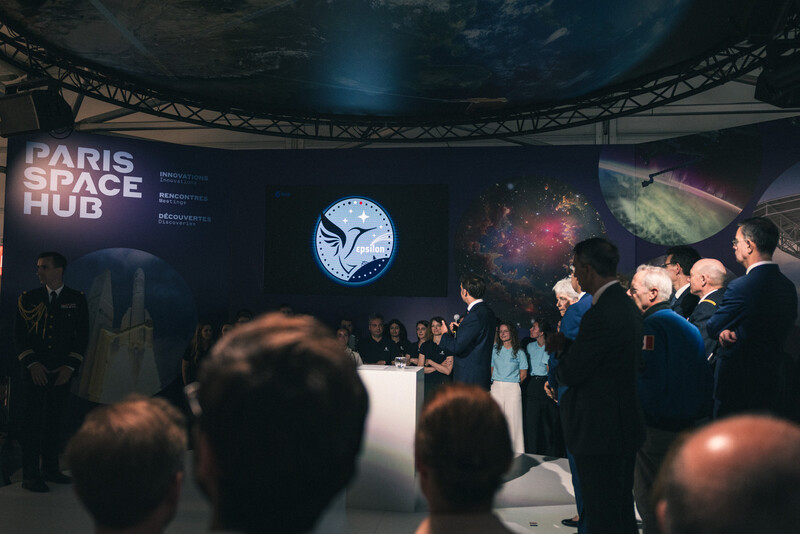Rights and Accountability 10 July 2025

The European Space Agency works closely with a subsidiary of the Israeli weapons giant Elbit Systems. (European Space Agency)
Some people are making a lot of money from Gaza’s obliteration.
The weapons makers Elbit Systems and Israel Aerospace Industries feature prominently in a new report on the “economy of genocide.” It was compiled by Francesca Albanese, the United Nations special rapporteur on human rights in the Palestinian territories occupied since 1967, prior to this week’s announcement that the US is sanctioning her.
Albanese’s report stresses that the ongoing genocide has proven to be a “profitable venture” for those firms.
They benefited massively from the 65 percent surge in Israeli military spending from 2023 to 2024. At $46.5 billion, the war budget for last year put Israel among the world’s largest per capita military spenders, Albanese notes.
Her report leaves no doubt that Elbit – Israel’s largest weapons firm – is a direct participant in the genocide. Elbit has “cooperated closely” on military operations, Albanese notes, “embedding key staff” in the defense ministry and been rewarded with the 2024 Israeli Defense Prize.
With Elbit contributing to genocide – the crime of crimes – the firm and its international wings ought to be ostracized.
The European Space Agency (ESA) is among the bodies which have continued to deal with Elbit’s business network during the genocide.
Just last month, OIP – an Elbit subsidiary based in Belgium – gloated that it had been selected by the agency to develop a “high-resolution thermal infrared dispersive spectrometer.” Potential uses of this “novel technology” include “target identification” and air quality monitoring, OIP stated.
In May, OIP shared what it called “hot and exciting news.” The firm was hyping up how the European Space Agency had chosen it to develop a spectrometer for a “mission to Venus.”
Before setting out for Venus, OIP headed toward the sun. In December last, the firm bragged that it had been “entrusted” with contributing “critical components” to an ESA project, which involves sending two spacecraft to observe the sun’s corona.
Headquartered in Paris, the European Space Agency is a publicly-funded body. This means that a subsidiary of Elbit, an Israeli weapons giant, is benefiting from activities financed by taxpayers without their consent.
Although the ESA is not a European Union institution, it has a partnership with the EU on Copernicus, an “Earth observation” satellite program. Earlier this year, OIP trumpeted that it had signed a contract with France’s Thales to deliver a “cloud imager” for Copernicus.
Coy
OIP is coy about its Israeli connections.
The announcement about the Venus mission stated that its objective was to understand how that planet “evolved so differently from Earth and became so uninhabitable.” There was no mention of how OIP’s parent Elbit Systems has played a huge role in ensuring that Gaza is unlivable.
For some time, OIP has promoted its products as “made in Belgium.” When Elbit and other Israeli weapons makers were banned from exhibiting at last month’s Paris Air Show, its subsidiary OIP was able to sidestep the ban by presenting as a Belgian firm.
Awareness that OIP is owned by Elbit has nonetheless grown considerably. One Flemish media outlet has even branded OIP “Belgium’s most reviled company” because of the relationship.
After its main plant was blockaded in the early stages of the genocide, OIP initiated proceedings against activists for alleged financial damage.
The lawsuit has not deterred further protests. Another OIP site was blockaded by numerous campaigners in the past few weeks.
Despite the firm’s attempts to distance itself from Israel, it has clearly employed people who have also worked for its parent firm, Elbit.
Marc Allegaert, a former OIP director, is now a Netherlands-based finance adviser to Elbit, judging by his LinkedIn profile.
The software engineer Wim Coelus specifies on his résumé that he has been responsible for “knowledge transfer” between Elbit and OIP (where he worked for five years).
Gilad Weitman moved from being a vice president with Elbit to a comparably similar position with OIP in Belgium. There, he “spearheaded and executed new business development programs and [the] penetration of new markets,” according to his LinkedIn page.
Bought by Elbit in 2003, OIP was the Israeli firm’s first European subsidiary. As Weitman hints, OIP has been instrumental in allowing Elbit to expand.
Today, Elbit is Israel’s largest weapons exporter, with Europe accounting for 27 percent of its total revenue.
The firm is doing well, yet it is not complacent.
Elbit’s latest annual report notes that boycott actions have increased since the “Swords of Iron War” – Israel’s codename for the Gaza genocide – began. “Restrictive laws, policies or practices directed towards Israel or Israeli businesses or a decision to reduce trade with Israeli businesses could have a material adverse effect on our business, reputation, financial condition, results of operations and cash flow,” the report says.
The anxiety about damage to Elbit’s reputation should be contextualized.
If the firm has been able to fuel a genocide without such damage, that is because clients and collaborators have kept on dealing with it. Palestinians are being killed and maimed with Elbit weapons and they do not give a damn.






Comments
Wasrael
Permalink kronikdenny replied on
Miss Albanese is fearless! i love everything about her. She is the ONLY member of the UN worth keeping. Nazinyahu and Dondolf Twitler resent her for telling the truth. More power to her! And if anything happens to her, we'll know exactly who did it.
Add new comment